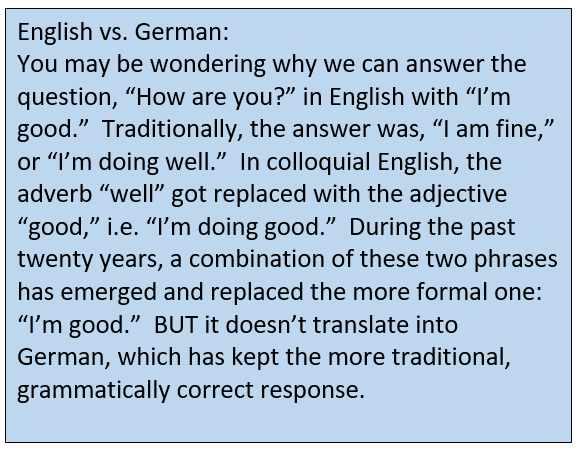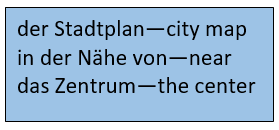8 Section 4-8
4.8: Personal Dative Expressions
To express feelings, German often uses a dative construction. In Chapter 1, you learned how to answer the question, “Wie geht’s?”
A: Wie geht’s?
B: Mir geht’s gut. ODER Es geht mir gut.
Why do we have mir, a dative personal pronoun, here in our answer?
A: How goes it to you?
B: To me goes it well.
Why would you not answer this question with, “Ich bin gut!”???

BEWARE!!! By NOT using a dative expression in your answer, it translates to “I am a good person.” With no context at all, it ends up sounding like, “I am good in bed.” BE CAREFUL NOT TO EMBARRASS YOURSELF IN A GERMAN-SPEAKING COUNTRY WITH THIS MISTAKE!!!!
Urban Dictionary says… https://www.urbandictionary.com/define.php?term=Ich%20bin%20gut
Common mistakes like these that are really embarrassing are like having nuclear bombs in the language.
 When answering questions about feelings and states of being, sometimes a dative expression is needed. Here are a few more examples.
When answering questions about feelings and states of being, sometimes a dative expression is needed. Here are a few more examples.
Ihm ist kalt. (Alternative: Ihm ist es kalt.)

Literally, this translates to, „To him it is cold.”
COMMON MISTAKE: You may be wondering why you can’t just say, “Er ist kalt.” That would end up translating to, “He is cold-hearted” or “He is very cold (toward someone.)”

Ihr ist heiß. (Alternative: Ihr ist es heiß.)
Literally, this translates to, „To her it is hot.”
COMMON MISTAKE: Like the example above, if you make the mistake of many native English speakers, you might say, “Sie ist heiß.” This would translate to mean that she is extremely sexy.

Another alternative is simply to say a generic, “Es ist heiß,” which you learned in Chapter 1.

Mir ist schlecht.
(I feel bad.)
But do not say, „Ich bin schlecht,“ because that means you are literally a bad person.
You can use this construction with things relating to how you feel.
Mir ist warm. (I feel warm.)
Mir ist kühl. (I feel cool.)

In addition, you can use a dative expression to describe someone’s opinion about something. In Chapter 1, you learned how to do it with the verb finden.
Ich finde den Roman zu lang. (I find the novel too long.)
We can restate this with a dative construction.
Der Roman war mir zu lang. (The novel was too long to me.)
Mir war der Roman zu lang. (To me, the novel was too long.)

Watch Easy German’s video to see many common mistakes that German learner’s make with personal dative expressions:
Ex. A: Beschreiben Sie die Bilder!
Ex. B: Beantworten Sie die Fragen in ganzen Sätzen.
- Wie geht es Ihnen?
- Ist Ihnen der Sommer hier zu trocken?
- Ist Ihnen dieses Zimmer zu heiß? Zu kalt? Zu warm? Zu kühl?
- Ist Ihnen diese Uni zu groß? Zu klein?
- War Ihnen der neue Star Wars Film zu langweilig? Zu kurz? Zu lang?
Ex. C: Listening Review: Deutschland’s wichtigste Regionen und Städte. Listen to the blurb about Germany and answer the questions. You will hear several of the landscape words you learned in chapter 3-1. (Audio used with permission of Germanlistening.com.)
Ex. D: Nicos Weg. Episode 40: Traumberufe. Watch episode 40 and do the online activities. You will review the modal verb wollen, which you learned in Chapter 3.
https://learngerman.dw.com/en/a1e9l4/l-37477568
Ex. E: Nicos Weg. Episode 41: Wo ist der Bahnhof? Watch episode 41 and do the online activities. For now, use the dative case after any new prepositions you might learn.






